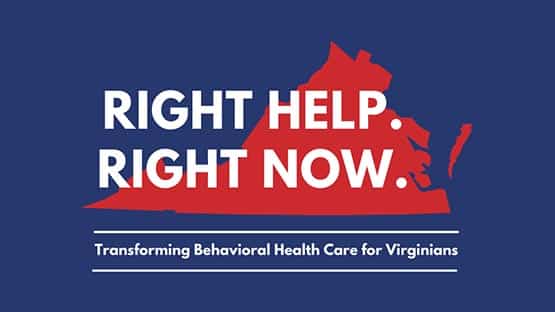
The centerpiece of the proposal will include $20 million to fully fund more than 30 new mobile crisis teams in the state to respond to calls to the 988 hotline. With this new funding, the investment in behavioral health in Virginia will exceed $660 million in the next fiscal year.
State Sen. Creigh Deeds’ son, Gus, died by suicide in 2013, after a documented battle with mental health. The senior Deeds sought an Emergency Custody Order the day before his son’s death, but according to reports, a bed was not available, and his son was not hospitalized. Since his son’s tragic death, Deeds has been on the front lines advocating for changes to the system that failed his family.
“I appreciate the governor’s attention to improving our crisis system. As the chair of the Behavioral Health Commission, I look forward to partnering with the administration on these issues. We must meet the moment with urgency. People’s lives are at stake,” said Deeds, D-Bath. “Properly funded, staffed and located, regional crisis centers can play an important role in meeting a crisis, and removing stress from the rest of the system. Because every Virginian should have access to the quality services they need, regardless of their zip code. This is a step in the right direction, but we need to do more.”
There are already mobile crisis units in larger cities throughout the state responding to a mental health crisis of children, teens and adults. The mobile units generally dispatch mental health professionals in place of fire, rescue and police to a mental health crisis – usually presenting less danger to the person in crisis and freeing up law enforcement to focus on crime.
Youngkin’s three-year plan is called “Right Help, Right Now.” The plan, released today, works to address behavioral health challenges encompassing crisis care, law enforcement burden, substance use disorder support, behavioral health workforce and service delivery innovation.
The current behavioral health system is being overwhelmed and failing to meet the needs of Virginians in crisis with an outdated model of care that relies too heavily on hospitals, according to the governor’s office.
“We are facing a behavioral health crisis across Virginia and the United States. This crisis is present throughout our society, at home, in schools and in the workplace. The three-year ‘Right Help, Right Now’ vision to revolutionize our behavioral health delivery system starts with a giant leap forward offered in my amended budget. It’s crucial that we get this moving, right now,” said Youngkin. “We incorporated best-in-class models of behavioral health from across the country. This is a top priority for my administration, and we will not stop until we have a system that delivers the ‘Right Help, Right Now’ to the people who need it most.”
Youngkin will propose a series of immediate steps to bolster his three-year transformation plan. The centerpiece of these proposals will include a $20 million proposal to fully-fund 30+ new mobile crisis teams to respond to calls to Virginia’s 988 hotline. With this new funding, the administration’s commitment to behavioral health will top $660 million in the next fiscal year.
“This plan will improve crisis care by expanding capacity for those in immediate need while also helping Virginians before they reach the crisis point. I’m hopeful that we can make a real difference for those who are most in need,” said State Del. Rob Bell, R-Charlottesville.
Governor’s budget recommendations
- $20 million to fund 30+ new mobile crisis teams, meeting our statewide goal in the first year, to respond to 988 hotline calls
- $58 million to increase the number of crisis receiving centers and crisis stabilization units, fully-funding the number of necessary centers in Southwest Virginia and Hampton Roads
- $15 million to expand the elementary, middle and high school-based mental health program to dozens of new communities
- $9 million to expand tele-behavioral health services in public schools and on college campuses
- $20 million for partnerships with hospitals for alternatives to emergency departments for crisis
- $9 million for transportation and in-hospital monitoring by law enforcement and other personnel
- $8 million for serious mental illness housing, creating 100 new placements for SMI patients with extraordinary barriers to discharge
- $57 million for 500 additional Medicaid Waiver Priority 1 Waitlist Slots and increased provider rates including respite and companion services
- $15 million in opioid abatement initiatives including a campaign to reduce fentanyl poisoning among our youth
‘Right Help, Right Now’ six pillars
- First, we must strive to ensure same-day care for individuals experiencing behavioral health crises.
- Second, we must relieve the law enforcement community’s burden and reduce the criminalization of mental health.
- Third, we must develop more capacity throughout the system, going beyond hospitals, especially community-based services.
- Fourth, we must provide targeted support for substance use disorder and efforts to prevent overdose.
- Fifth, we must make the behavioral health workforce a priority, particularly in underserved communities.
- Sixth, we must identify service innovations and best practices in pre-crisis prevention services, crisis care, post-crisis recovery and support and develop tangible and achievable means to close capacity gaps.
How Virginia ranks on mental health
- 80 percent of Virginia counties have a mental health professional shortage
- 2.8 million people live in the counties with shortages
- Virginia ranks 34th for states for access to care
- Virginia ranks 39th for states with mental health workforce availability
- Virginia ranked 48th out of 50 states for youth mental health
View the full “Right Help, Right Now” plan here.










